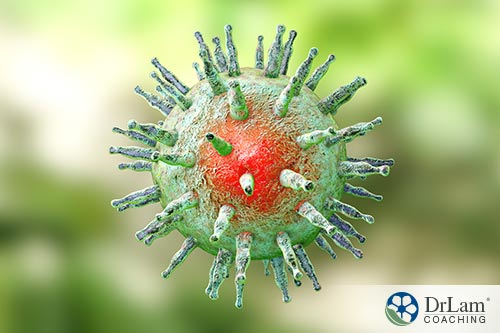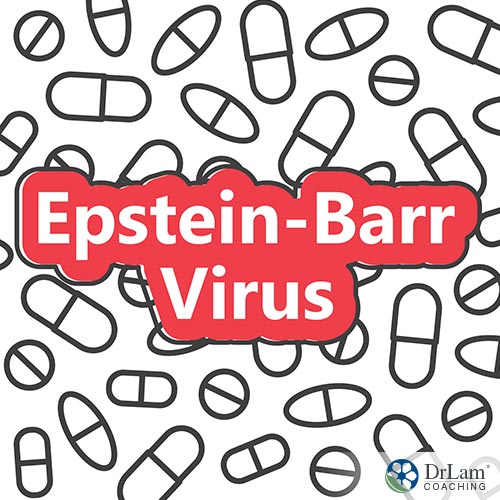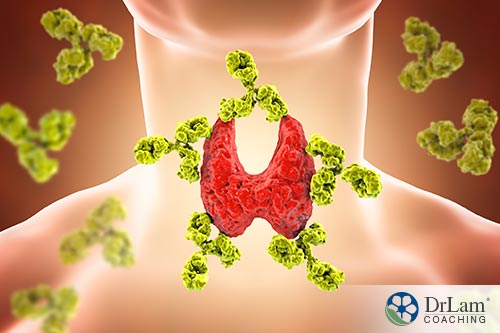 Better known as the virus that leads to mono or the "kissing disease," Epstein-Barr also poses a significant risk to your health. Although this virus can infect you without any significant symptoms, it later may reactivate and lead to serious health risks. The Epstein-Barr thyroid connection only recently came to light through research.
Better known as the virus that leads to mono or the "kissing disease," Epstein-Barr also poses a significant risk to your health. Although this virus can infect you without any significant symptoms, it later may reactivate and lead to serious health risks. The Epstein-Barr thyroid connection only recently came to light through research.
Because this virus stays in your body permanently once you become infected, it can serve as a trigger for serious thyroid problems. Clinical experience and research have found that Hashimoto’s thyroiditis is the most common of the related hypothyroid conditions. It results from your immune system becoming overactive and attacking healthy cells as well as invading pathogens, thus developing an autoimmune condition. This could be the mechanism behind the Epstein-Barr thyroid connection.
Most medical professionals understand Epstein-Barr and the symptoms of a typical infection that causes mono. However, not many of them also understand the long-term nature of this virus. Initially, it may bring on no more than significant fatigue, fever, sore throat, and swollen lymph nodes. On the other hand, the virus acts like a stealth virus so often encountered by those who suffer from Adrenal Fatigue Syndrome (AFS). It literally hides in the body and does not fully die off.
As a result, medical professionals may only address symptoms of the relatively mild infection due to the virus and may believe it has been eradicated it from your body. Later in life, however, it can become reactivated and begin causing symptoms again. Those with compromised immune systems tend to suffer the most serious symptoms such as autoimmune conditions like Hashimoto’s thyroiditis.
In addition, as many as 60 varieties of this virus exist. Rather than a simple, short-term viral infection, it becomes a long-term health risk because of the Epstein-Barr thyroid connection.
The Epstein-Barr thyroid connection involves the inflammation and hormone circuits of the NeuroEndoMetabolic (NEM) Stress Response mechanism. This mechanism works to enable your body to deal with stress that your adrenal glands can’t handle through their release of cortisol.
The Inflammation circuit consists of your immune system, the gut, and the microbiome. If you have a dysfunction of this circuit, your gut and microbiome are prone to entering a state of dysbiosis with an imbalance of healthy bacteria versus unhealthy bacteria. This results in a "leaky gut", which allows pathogens and undigested food particles into your bloodstream. Once this occurs, your immune system can become hyperactive due to the volume of foreign matter invading your body. This leads to your immune system attacking healthy tissue in its efforts to protect your body. This becomes the foundation for autoimmune conditions such as Hashimoto’s thyroiditis when a trigger such as Epstein-Barr becomes active.
The hormonal circuit of the NEM consists of the ovaries in females, testes in males, the adrenal glands, and the thyroid. When you come under stress from any source, your adrenal glands release cortisol to help you deal with the effects of this stress. Epstein-Barr infection becomes a source of such stress.
The organs involved in this circuit depend on each other hormonally for optimal functioning. If one becomes overwhelmed, it affects the others. With weakened adrenal functioning due to chronic stress, you are likely to also experience thyroid dysfunction and, for women, problems with the menstrual cycle.
In the same way, if your thyroid is under-productive, it may cause further weakening of your adrenals. In addition, if you suffer from estrogen dominance due to ovarian hormone imbalance, it will likewise exacerbate any hypothyroidism you experience.
Reactivation of the Epstein-Barr virus most commonly comes from chronic stress. Therefore, those who suffer from adrenal fatigue are more likely to experience a higher risk of this reactivation. Other possible causes of reactivation include:
Some of the most common symptoms related to Epstein-Barr appear in AFS as well. This can complicate an accurate assessment of those who suffer from AFS. The most common symptoms include:

These symptoms will typically occur in the initial infection that can last up to four weeks. In some people, the symptoms linger for months. Once your immune system fights off the virus, it becomes dormant in some part of your body. If your immune system doesn’t work efficiently, the symptoms will last longer.
The Epstein-Barr virus goes through four stages of increasing health risks.
This stage encompasses initial exposure and infection. You may experience no symptoms at this point because the virus lurks in the bloodstream, gaining strength for a later opportunity to strike. Such an opportunity may come at a time of hormonal changes such as puberty or pregnancy. It can also come when you are experiencing chronic stress, when you feel burned out, or if you aren't eating right. Thus, this stage may last for years.
In this stage, you are most contagious. You may develop mononucleosis with mild symptoms or more severe symptoms. The length of time you experience these symptoms also varies from person to person.
In addition, in this stage the virus targets one or more body systems to hide in. Often, it will gravitate to the liver or spleen because of the toxins typically found in these organs.
In stage two, the assessment of the infection is also easier. Blood work and symptoms confirm the existence of mono, leading to the standard attempts at remediation. After this stage, accurate assessment of Epstein-Barr becomes more difficult. Even if it remains active in your body, your healthcare professional can miss it. Consequently, it becomes even more important for you to consult with someone who knows about this virus and its behavior. This becomes even more necessary if you suffer from AFS and have dysfunction of the Inflammation or Hormonal circuit, or both.
In stage three, Epstein-Barr shows itself as a stealth virus. It resides in one or more of your organs and leads to inflammation without triggering your immune system. Blood work at this stage will indicate antibodies showing a previous infection. Even though this lab work may indicate no active infection, the virus can still cause health problems. Your immune system may no longer attack the virus because it remains hidden. However, the added inflammation caused by the virus increases the risk of developing an Epstein-Barr thyroid connection.
During this stage, accurate assessment proves difficult. Blood work typically doesn’t pick up indications of the virus. The virus typically begins affecting your nervous system at this stage, resulting in nerve pain and achiness throughout your body. Ongoing fatigue, numbness in extremities, and sleeplessness often become apparent.
 The Epstein-Barr thyroid connection occurs during stage three of the virus. This stage is when the virus chooses which organ or system in your body to hide in. Even after this, however, the virus can leave that organ and attack other places in your body, including your thyroid.
The Epstein-Barr thyroid connection occurs during stage three of the virus. This stage is when the virus chooses which organ or system in your body to hide in. Even after this, however, the virus can leave that organ and attack other places in your body, including your thyroid.
Once the virus enters your thyroid, it can actually kill thyroid cells, leading to Hashimoto’s thyroiditis. Normally, when a virus invades one of your organs, your immune system becomes activated to deal with it. The Epstein-Barr virus can produce neurotoxins that work to confuse your immune system. These toxins serve to keep your immune system from finding the virus in your thyroid and from fighting it if it does find it.
It appears Epstein-Barr specifically targets your thyroid as a means to disrupt your endocrine system and thus find a way to invade your nervous system.
In addition to Hashimoto’s, this virus is also linked to other autoimmune conditions such as lupus and a type of B-cell lymphoma.
Several possible mechanisms appear involved in the Epstein-Barr thyroid connection as well as other autoimmune conditions.
One possible mechanism relates to molecular mimicry. This occurs when your immune system reacts to proteins in your body that are similar to those associated with a virus. In this case, your immune system attacks both the virus and your thyroid.
In addition, CD8+ T-cell deficiency can lead to poor control of this kind of viral infection. Likewise, it can lead to an overactive immune response that targets your thyroid or whichever organ the virus invades.
Further, those with an already existing autoimmune condition may experience a higher viral load, and what is called "bystander activation" of the immune system in response to ongoing infection.
Chronic stress or poor nutrition also can hamper the effectiveness of the immune system.
In the presence of Hashimoto’s, thyroid antibody levels decline dramatically when remediation of the virus occurs.
Several options exist if you think you suffer from chronic Epstein-Barr or effects of the Epstein-Barr thyroid connection.
The best way of addressing the Epstein-Barr thyroid connection is to adopt a comprehensive approach that includes supporting your gut health, reducing stress, balancing hormones, and handling inflammation.
The Epstein-Barr virus poses a significant health risk due to its functioning like a stealth virus. In other words, it hides in various organs until something triggers it to re-emerge and reactivate. You may have had the virus for years and not know it.
Once it reactivates, it poses a health threat through the Epstein-Barr thyroid connection. The virus can lead to the development of Hashimoto’s thyroiditis, perhaps the most common hypothyroid condition in the U.S.
 It becomes an autoimmune condition due to the effects of increased inflammation and an over-active immune response. For those with AFS or dysfunctional Inflammation or Hormonal circuits of the NEM, the risk of developing Hashimoto’s increases. Symptoms of Epstein-Barr appear similar to those of AFS.
It becomes an autoimmune condition due to the effects of increased inflammation and an over-active immune response. For those with AFS or dysfunctional Inflammation or Hormonal circuits of the NEM, the risk of developing Hashimoto’s increases. Symptoms of Epstein-Barr appear similar to those of AFS.
If you are suffering from the Epstein-Barr thyroid connection, there are steps you can take to improve your health, as noted above.
Whatever course of action you decide to take, however, please do so with the guidance of your healthcare professional who will assess your options and help you choose the best approach for your health.
If you would like to know more about or need assistance with choosing ways to deal with the Epstein-Barr thyroid connection, the team at Dr. Lam Coaching can help. We offer a free** no-obligation phone consultation at +1-626-571-1234 where we will privately discuss your symptoms and various options. You can also send us a question through our Ask The Doctor system by clicking here.
The Epstein-Barr thyroid connection could be an explanation for the development of hypothyroidism, especially Hashimoto’s thyroiditis. This virus can lie dormant for years, then burst forth under the right conditions to attack your thyroid. It also may form the foundation for other autoimmune conditions.
